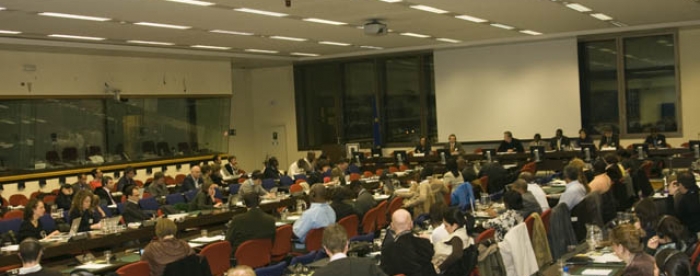News
Our stories ... ...

the Netherlands - 24 January, 2011
Tropenbos International and six other organisations organised the seminar "Bridging local and global interests: Integration of domestic timber markets in FLEGT/VPAs and REDD+"to discuss how to address domestic timber trade and timber-dependent livelihoods effectively in VPAs; map the potential consequences of VPAs on local livelihoods; and discuss the relevance of these for the further development of forest governance programmes such as FLEGT and REDD+.
The rapid decline of the world’s tropical rainforests has been a growing concern for many years now and much attention of the international community has gone to the promotion of the legalization and certification of the international timber trade. These measures have stimulated better management, but for the effective conservation of tropical forests the current dominant focus on international timber flows is not sufficient.
There is a growing recognition that more attention should be paid to local timber production and consumption in tropical countries and how these intertwine with the international market. Domestic timber production represents a high percentage of total timber production in tropical countries, ranging from 30-40% in Guyana, Congo, DR Congo and Uganda to more than 50% in Ghana, Cameroon and most Latin American countries, to nearly 100% in Liberia. Local timber markets in tropical countries are largely equipped with cheap wood from chainsaw milling, the on-site conversion of logs into lumber. While it offers socio-economic opportunities to local people, chainsaw milling is often associated with corruption and illegal practices. Regulating and controlling the practices is a challenge due to the multiplicity of overlapping interests and the wide range of actors involved.
Only recently the importance of local timber consumption and trade has been recognized in international negotiations and agreements, for example in the European Union (EU) Action Plan for Forest Law Enforcement Governance and Trade (FLEGT) and climate change negotiations (through REDD+).
In order to see how domestic timber trade could effectively be addressed within Voluntary Partnership Agreements (VPAs) under FLEGT and REDD+, the seminar “Bridging local and global interests: Integration of domestic timber markets in FLEGT/VPAs and REDD +” was organised in Brussels. More than 100 participants comprising policy makers from the European Commission and various producers and consumer countries, industry, NGOs and research institutions involved in FLEGT and REDD+, concluded, amongst others, that:
During the meeting the ETFRN News 52 on "Chainsaw milling: supplier to local markets" was presented. This publication provided an important input to the seminar. The 28 articles with contributions from over 20 countries in South America, the Caribbean, Asia and Africa, provide an overview of the nature, extent and implications of chainsaw milling as a supplier to local and regional timber markets in various countries. The publication also gives a good picture of the key issues, challenges and opportunities of chainsaw milling and illustrates the importance to include local timber flows in national and international forest policy, such as FLEGT and REDD+.